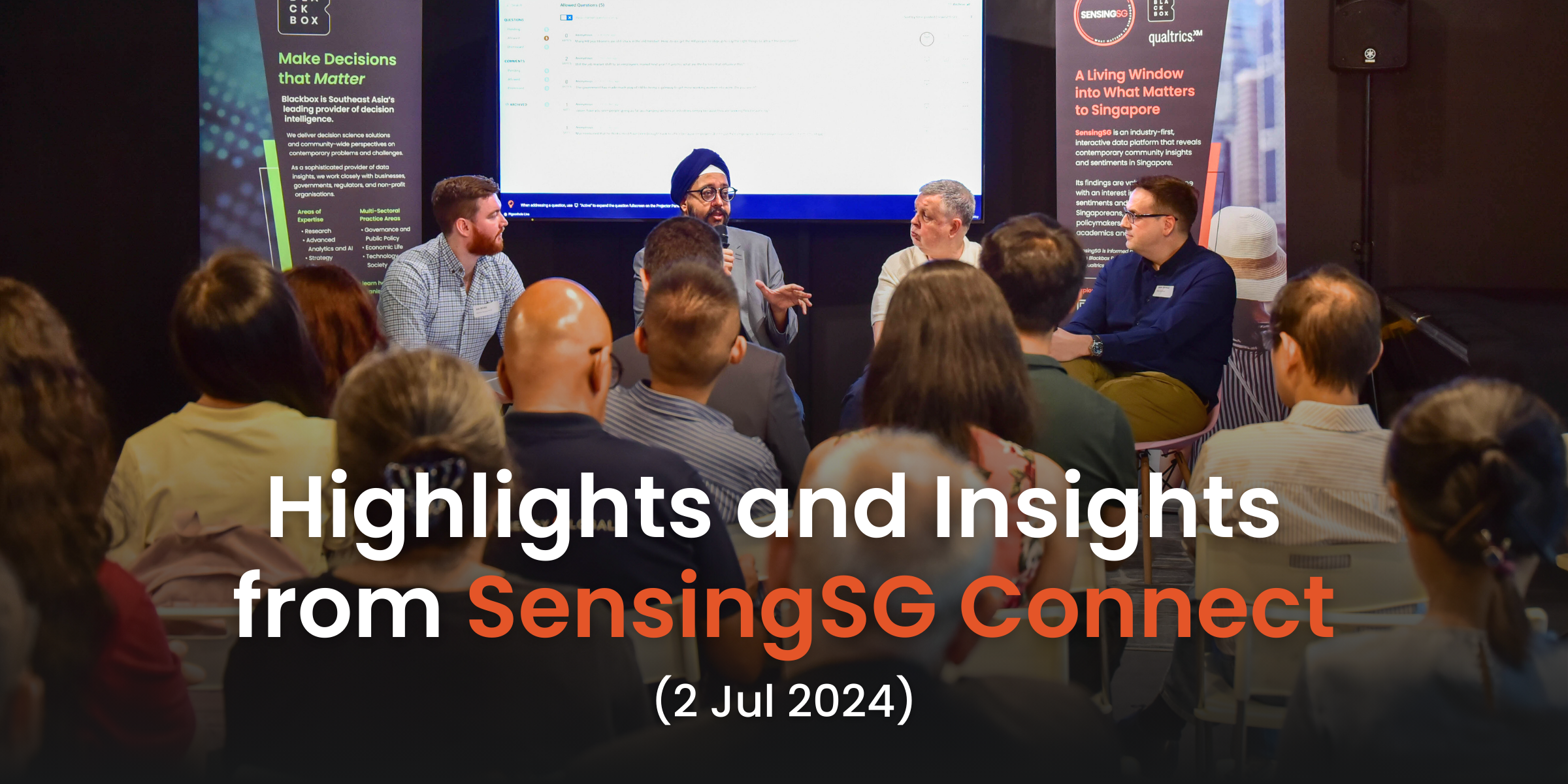Singapore in Transition: Navigating Workplace Evolution, Leadership Renewal, and Changes in Citizen Expectations
Setting the Scene
On July 2nd, 2024, Blackbox Research hosted "SensingSG Connect”, an event focusing on the theme of "Singapore in Transition". David Black, founder and CEO of Blackbox Research, opened the session by welcoming attendees and explaining the event’s open and transparent nature. Unlike other events restricted by Chatham House rules, all data discussed at SensingSG Connect is publicly accessible, reflecting Blackbox’s commitment to open discourse of societal issues.
David outlined the main topics of the event: the political transition marked by the appointment of Lawrence Wong as Singapore’s new Prime Minister, the demographic and attitudinal shifts among Singaporeans, and the evolving dynamics of today’s workplace. He highlighted how these changes are shaping Singapore's present and future, emphasising the relevance of the recent data set collected just days after Wong's appointment, offering fresh insights into community reactions and expectations.
David noted that this event was the third quarterly iteration of SensingSG, a series that evolved from an older newsletter pre-COVID (“YouKnowAnot?”). Since 2023, SensingSG has been expanded and reconceived, incorporating more interactive elements and data visualizations available on its own bespoke platform.
Panel Discussion: The Workplace Reimagined
The panel discussion was moderated by Joe Boag, Head of Client Solutions at Blackbox, and included insights from David Black, Malminderjit Singh (CEO and Regional Director of Speyside Group), and Jason Nangle (Founder and Managing Director of Angle Recruitment).
Evolving Workplace Trends
The panel began by discussing workplace trends. Despite the rise in remote work during COVID, nearly 60% of Singaporeans have returned to full-time office work. Mal noted that this reflects local employers' preference for in-office presence due to concerns about trust and accountability. He stressed the need for companies to rethink workforce management and leverage technology to enhance productivity and engagement.
Jason offered insights from a recruitment perspective, highlighting that flexible working arrangements are crucial for candidates, especially in sectors like finance. He noted that while the maritime industry places less emphasis on flexibility post-COVID, it remains an important consideration for talent attraction and retention.
David added that while there is strong support for hybrid work among Singaporeans, acceptance varies across industries and socioeconomic statuses. Higher-income households have more opportunities for flexible work, whereas traditional sectors are slower to adopt these arrangements.
AI in the Workplace
The panel also addressed AI adoption in the workplace. David shared that Singaporeans are more supportive of implementing AI compared to their regional counterparts, although concerns about job security persist. He noted generational differences, with younger employees desiring more opportunities to contribute ideas but facing resistance from older management.
Government Role in Workplace Transition
The role of the government in promoting flexible work was another key discussion point. Mal suggested the government should focus on engagement and education rather than strict enforcement. David proposed that incentives, such as tax breaks for companies adopting productivity tools that support hybrid work, could be effective in encouraging businesses to embrace these changes.
Audience Q&A
During the Q&A session, Mal and Jason discussed the potential for flexible working arrangements to attract more women into the workforce, emphasising its importance for diversity and inclusion efforts.
An audience member asked about the government's role in promoting flexible work. Mal suggested that the government should focus on engagement and education rather than strict enforcement. David proposed incentives like tax breaks for companies adopting productivity tools that support hybrid work. Another question inquired about whether the job market might shift to favor employees again. Jason noted the current high demand and expressed optimism for a promising future, but acknowledged that the situation is always subject to change.
Regarding climate change, David noted that it is a consistent topic in focus groups, reflecting a crucial community issue. When asked about international political interest, David and Mal pointed out that Singaporeans prioritise local and regional issues, with major international events like the US election drawing interest only closer to the date. They discussed Lawrence Wong’s leadership style, with David noting Wong’s pragmatic approach and Mal highlighting his appeal among younger generations and the consultative nature of his leadership.
Insights Presentation: On a Post-Budget Bounce and Leadership Renewal
Glenn Wray, Blackbox’s Head of Strategy and Marketing, delivered a presentation that provided an overview of contemporary community insights from SensingSG, focusing on public sentiment and governance.
Public Sentiment
The data revealed that Singaporeans are increasingly optimistic, with nearly nine in ten believing the country is heading in the right direction—a 7% increase from three months ago. Additionally, 71% expect economic improvement within the next year, influenced by Lawrence Wong’s impactful budget and recent appointment as Prime Minister.
Personal Finances and Governance
The improvement in personal finances was attributed to government measures such as GST vouchers and other financial aids. This optimism was reflected in significant increases across all personal financial metrics in May and June. The Good Governance Measure score also rose from 63% to 66%, indicating broad community satisfaction in areas like GST, cost of living, housing affordability, salaries and wages, and cybersecurity.
Broad Approval for New Prime Minister
Lawrence Wong enjoys a high approval rating of 76%, although only 12% of respondents feel they clearly understand his leadership style. The economy and inflation remain top priorities for Singaporeans, followed by jobs and housing affordability. This data suggests that while there is interest in broader leadership and vision, economic issues are paramount.
Trending News and Government Interactions
The presentation highlighted trending news stories, noting that younger Singaporeans are particularly interested in flexible work guidelines and political events. Despite a push for digital government services, 42% still prefer in-person interactions, indicating a need for a balanced approach.
Glenn finished by sharing an insight that younger Singaporeans are increasingly preoccupied with climate-related issues, with under-30s ranking the recent Southeast Asian heatwave as just as big a story as Lawrence Wong’s accession Prime Minister.
Q&A Session
During the Q&A session, David noted that climate change is a consistent topic in focus groups, showing its importance to the community. Glenn added that while Singaporeans are generally more focused on local issues, international events like the Gaza conflict and major elections can still draw significant attention.
David and Mal discussed the public's pragmatic approach to politics, with Mal highlighting that Singaporeans prioritise economic performance over personality in their leaders. David suggested that Lawrence Wong’s performance during COVID and his comfort with social media have contributed to his popularity, but his true test will come when he faces a crisis.
Questions about the role of government in social changes, such as civil rights and treatment of migrant workers, were also addressed. David and Mal agreed that the Singapore government tends to wait for a clear mandate from the public before making substantial changes, as seen with the repeal of Section 377A. Mal added that while Lawrence Wong’s leadership is consultative and practical, significant social changes will likely be cautious and depend on ground sentiment.
The final Q&A also touched upon Blackbox's purpose and intentions with SensingSG. David clarified that Blackbox is foremostly a “data shop” focused on presenting independent data reflecting citizen sentiment, rather than a political consultancy. Glenn added to this by articulating how Blackbox aims to foster open discussions based on data, without government interference, although mainstream media coverage varies. David rounded this off by stating Blackbox's role is to keep discussions open and data-driven, providing valuable insights for policy and business decisions.
SensingSG Connect provided valuable insights into Singapore’s evolving landscape, highlighting the importance of continuous engagement and adaptation to meet the changing needs and expectations of Singaporeans. The event underscored the significance of understanding public sentiment and leveraging data to inform policy and business decisions.
Don’t miss the next one! Connect with us via any of the methods listed below.
Explore SensingSG for yourself: https://bit.ly/sensingsg
Sign up for our newsletter: https://bit.ly/bb-newsletter-signup
Follow us on LinkedIn: https://bit.ly/BB-Linkedin
Connect with us: connect@blackbox.com.sg





